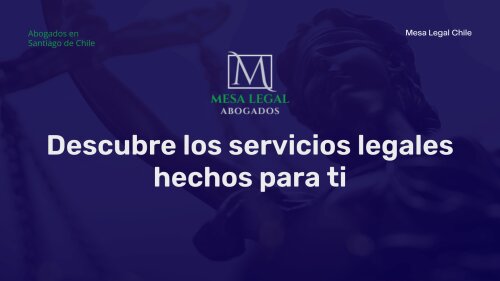Best Drunk Driving Lawyers in Santiago
Share your needs with us, get contacted by law firms.
Free. Takes 2 min.
List of the best lawyers in Santiago, Chile
About Drunk Driving Law in Santiago, Chile
Drunk driving, known locally as "conducción en estado de ebriedad" or "bajo la influencia del alcohol," is a significant legal and social issue in Santiago, Chile. The Chilean government enforces strict regulations against driving under the influence of alcohol to protect road safety and prevent accidents. Penalties for offending drivers can be severe, including fines, license suspension, and imprisonment in the most serious cases. Awareness of local laws and seeking legal advice is crucial for anyone involved in a drunk driving incident in Santiago.
Why You May Need a Lawyer
There are several situations where individuals facing drunk driving charges in Santiago may require legal assistance. If you have been stopped at a police checkpoint and tested over the legal blood alcohol limit, you may face criminal charges and administrative penalties. Accidents involving injuries or property damage can further complicate your case, leading to more severe consequences. A lawyer can help you navigate the complexities of Chilean law, ensure your rights are protected, and represent you effectively in court or administrative proceedings. Legal advice is also essential if you believe the police testing procedures were flawed, your rights were violated, or if you are a foreigner unfamiliar with local regulations.
Local Laws Overview
Chile’s drunk driving regulations are primarily governed by the “Ley de Tránsito” (Law No. 18.290) and recent legislative amendments such as the “Ley Emilia.” Santiago, as the nation’s capital, enforces these laws rigorously. The law distinguishes between driving “under the influence of alcohol” with a blood alcohol content (BAC) of 0.3 to 0.79 grams per liter, and “driving in a state of inebriation” with a BAC of 0.8 grams per liter or more. Penalties escalate based on BAC level, repeat offenses, and the presence of aggravating circumstances such as causing injuries or death. Penalties include fines, suspension of driver’s license, jail time, and in severe cases, permanent license revocation.
Frequently Asked Questions
What is the legal blood alcohol limit for drivers in Santiago, Chile?
For private vehicle drivers, the legal BAC limit is 0.3 grams per liter. For professional drivers and motorists under 21 years old, any amount of alcohol detected is considered an offense.
What happens if I refuse a breathalyzer or blood test?
Refusing to take a breathalyzer or blood test is treated as a presumption of guilt. This can lead to immediate penalties, including license suspension and possible criminal charges.
What are the penalties for first-time offenders?
First-time offenders may face fines, suspension of their driver’s license, possible jail time (especially for higher BAC levels), and mandatory attendance of educational programs.
Can a foreigner be prosecuted for drunk driving in Santiago?
Yes, foreigners are subject to the same laws as residents. Additional complications can arise, including travel restrictions or deportation in severe cases.
How long is a driver’s license typically suspended after a drunk driving conviction?
License suspension varies from 3 months to several years, depending on the BAC level, whether it is a repeat offense, and if there was an accident involved.
Can I appeal a drunk driving conviction?
Yes, it is possible to appeal a conviction, especially in cases involving procedural errors, mistaken identity, or improper testing procedures. A qualified lawyer can advise on the best approach.
Are there alternative penalties such as community service?
In some cases, Chilean courts may impose alternative penalties like community service or participation in rehabilitation programs, but this depends on the specifics of the case and judicial discretion.
Will a drunk driving charge go on my permanent record in Chile?
Yes, a conviction will be recorded in your criminal and driving history, potentially impacting your employment opportunities and insurance rates.
What should I do immediately after being stopped for suspected drunk driving?
Remain calm, cooperate with police instructions, request to notify a lawyer as soon as possible, and comply with testing protocols. Do not admit guilt or sign documents without legal advice.
Can I continue driving while my case is being processed?
In many cases, your license will be temporarily suspended during the investigation or until a court decision. Driving without a valid license can result in additional penalties.
Additional Resources
If you need further assistance regarding a drunk driving case in Santiago, the following resources can be useful:
- Carabineros de Chile (Chilean National Police): For immediate police assistance and legal protocols
- Comisión Nacional de Seguridad de Tránsito (CONASET): For statistics, prevention campaigns, and traffic safety regulations
- Fiscalía de Chile: For prosecutorial procedures and public defense information
- Colegio de Abogados de Chile: For finding qualified legal professionals
- Ministerio de Transportes y Telecomunicaciones: For regulations and license-related matters
Next Steps
If you or someone you know is facing a drunk driving charge in Santiago, Chile, it is crucial to act promptly. Begin by gathering all incident-related documents and information. Contact a lawyer who specializes in traffic and criminal law to discuss your case in detail. Avoid making statements to authorities without legal counsel. Consider reaching out to the recommended resources for additional support and information about your rights. Taking swift, informed action is key to effectively addressing and resolving drunk driving legal matters in Santiago.
Lawzana helps you find the best lawyers and law firms in Santiago through a curated and pre-screened list of qualified legal professionals. Our platform offers rankings and detailed profiles of attorneys and law firms, allowing you to compare based on practice areas, including Drunk Driving, experience, and client feedback.
Each profile includes a description of the firm's areas of practice, client reviews, team members and partners, year of establishment, spoken languages, office locations, contact information, social media presence, and any published articles or resources. Most firms on our platform speak English and are experienced in both local and international legal matters.
Get a quote from top-rated law firms in Santiago, Chile — quickly, securely, and without unnecessary hassle.
Disclaimer:
The information provided on this page is for general informational purposes only and does not constitute legal advice. While we strive to ensure the accuracy and relevance of the content, legal information may change over time, and interpretations of the law can vary. You should always consult with a qualified legal professional for advice specific to your situation.
We disclaim all liability for actions taken or not taken based on the content of this page. If you believe any information is incorrect or outdated, please contact us, and we will review and update it where appropriate.












